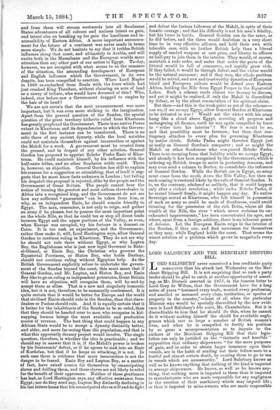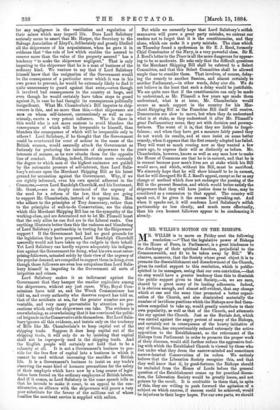LORD SALISBURY AND THE MERCHANT SHIPPING BILL.
TIORD SALISBURY never conceived a less creditable party manoeuvre than his attack last Wednesday on the Mer- chant Shipping Bill. It is not surprising that so rash a party leader should be glad to catch at another opportunity of assert- ing, as Mr. Disraeli asserted in 1873, in the famous letter to Lord Grey de Wilton, that the Government have for a long series of years " harassed every trade, worried every profession, and assailed or menaced every class, institution, or species of property in the country,"—least of all when the particular Minister who would be specially discredited by the new evid- ence is Lord Salisbury's bete noire, Mr. Chamberlain. But it is discreditable to him that he should do this, when he cannot do it without making himself the shield for avoidable negli- gences which cost so large a number of British seamen's lives, and when he is compelled to fortify his position by so gross a misrepresentation as to impute to the authors of the Merchant Shipping Bill that their legis- lation can only be justified on the " fantastic and horrible " supposition that ordinary shipowners, "for the mere purposes of gain, and in order to obtain larger insurance upon their vessels, are in the habit of sending out their fellow-men to a fearful and almost certain death, by causing them to go to sea in vessels which are unseaworthy." Lord Salisbury knows as well as he knows anything that nothing of the kind is imputed to average shipowners. He knows, as well as he knows any- thing, that nothing more is imputed to them than is imputed to manufacturers who are made responsible for any negligence in the erection of their machinery which may imperil life ; or than is imputed to mine-owners, who are made responsible
for any negligence in the ventilation and regulation of their mines which may imperil life. Does Lord Salisbury seriously mean to assert that Mr. Harper, the Secretary to the Salvage Association of Lloyd's, deliberately and grossly libelled all the shipowners of his acquaintance, when he gave it in evidence that " the rule of law which enables the assured to recover more than the value of the property assured " has a tendency " to make the shipowner negligent." That is only imputing to the shipowner that he is a man of business of the ordinary kind. We venture to say that if Lord Salisbury himself knew that the resignation of the Government would be the consequence of a particular error which it was in his own power to prevent, he would be extremely likely to find it quite unnecessary to guard against that error,—even though it involved bad consequences to the country at large, and even though he would certainly have taken steps to guard against it, in case he had thought its consequences politically insignificant. What Mr. Chamberlain's Bill imputes to ship- owners is this, and no more than this,—that shipowners are men on whom self-interest, unconsciously as well as con- sciously, exerts a very potent influence. Who is there in this world who is not more anxious to avoid blunders the consequence of which will be irreparable to himself, than blunders the consequence of which will be irreparable only to others ? Lord Salisbury, if he thought that the Government could be overturned for want of ardour in the cause of the British seamen, would assuredly attack the Government as furiously for preferring the interests of shipowners to the interests of .seamen, as he now attacks them for the opposite line of conduct. Nothing, indeed, illustrates more curiously the degree to which men of the highest eminence are guided by the automatic pressure of self-interest, than Lord Salis- bury's seizure upon the Merchant Shipping Bill as his latest ground for accusation against the Government. Why, if we are rightly informed, even his own special adherent in the Commons,—even Lord Randolph Churchill, and his lieutenant, Mr. Gorst,—are so deeply convinced of the urgency of the need for a reform of the law, that they are going to support Mr. Chamberlain, instead of to oppose him. Men who adhere to the principles of Tory democracy, rather than to the principles of well-to-do Conservatism, see the claim which this Merchant Shipping Bill has on the sympathy of the working-class, and are determined not to let Mr. Plimsoll boast that the only allies he can find are in the Liberal ranks. Can anything illustrate better than this the rashness and blundering of Lord Salisbury's partisanship in touting for the Shipowners' support ? If the Government had had no good grounds for the legislation they have proposed, Lord Randolph Churchill assuredly would not have taken up the cudgels in their behalf. Yet Lord Salisbury can hardly express adequately his indigna- tion against the Government for doing, what his own most enter- prising followers, actuated solely by their view of the urgency of the popular demand, are compelled to support them in doing, even though those followers are even less scrupulous than Lord Salis- bury himself in imputing to the Government all sorts of iniquities and crimes.
Lord Salisbury makes it an indictment against the Government that they hamper the smaller capitalists among the shipowners, without any just cause. Why, Royal Com- missions have told us, and the Wreck Commissioner has told us, and every authority who deserves respect has told us, that of the accidents at sea, far the greater number are pre- ventable, and very many preventable by attention to pre- cautions which only the shipowners can take. The evidence is overwhelming, so overwhelming that it has convinced the politi- cal brigands on the Conservative side themselves. But Lord Salis- bury ignores all this evidence, and insists only on the tendency of Bills like Mr. Chamberlain's to keep capital out of the shipping trade. Suppose it does keep capital out of the shipping trade, it will only do so by insisting that capital shall not be improperly used in the shipping trade. And the English people will certainly not hold that to be a
calamity at all. It is not a Government's business to pro- vide for the free flow of capital into a business in which it cannot be used without increasing the sacrifice of British life. It is a Government's business to insist on any trade's observing the same kind of humane precautions for the safety of their employes which have now by a long course of legis- lation been forced on the ordinary employers of British labour. And if it comes, as Lord Salisbury in the same speech tells us that he intends to make it come, to an appeal to the con- stituencies, an alliance with the shipowners will prove a very poor substitute for the favour of the millions out of whose families the merchant service is supplied with sailors. But while we earnestly hope that Lord Salisbury's selfish manoeuvre will prove a great party mistake, we entreat our readers not to forget that it is the constituencies, and they alone, which can make it a party mistake. The class which on Thursday found a spokesman in Sir E. J. Reed, formerly Chief Constructor of the Navy, is a very powerful class. Sir E. J. Reed's letter to the Times is all the more dangerous for appear- ing to be so moderate. He asks only that the difficult questions in the Merchant Shipping Bill shall be referred to a Select Committee, and that this Select Committee shall be allowed ample time to consider them. That involves, of course, delay- ing the remedy to another Session, and almost certainly to another Parliament,—in other words, delay sine die. We do not believe in the least that such a delay would be justifiable. We are quite sure that if the constituencies can only be made to understand, as Mr. Plimsoll a few years ago made them understand, what is at issue, Mr. Chamberlain would secure as much support in the country for his Mer- chant Shipping Bill as the Franchise Bill itself will receive. Democracies are slow to move, but when they do understand what is at stake, as they understood it after Mr. Plimsoll's great Parliamentary scene, they act with decision and peremp- toriness. The worst of it is, that they are liable to forget- fulness ; and when they have got a measure fairly passed they do not watch its results, and at once insist on some better remedy, when it appears that the first remedy adopted has failed. They will want as much rousing now as they wanted a few years ago, to express their will as distinctly as before. Mr. Chamberlain, however, knows as well as any man how to make the House of Commons see that he is in earnest, and that he is in earnest because poor men's lives are at stake which his Bill would save, and which, without his Bill, must be sacrificed. We sincerely hope that he will show himself to be in earnest, that he will disregard Sir E. J. Reed's appeal, except so far as any change of method which does not endanger the passing of the Bill in the present Sesssion, and which would better satisfy the shipowners that they will have justice done to them, may be considered as a concession to that appeal. The country will speak out, if he gives it the excuse for speaking out. And when it speaks out, it will condemn Lord Salisbury's selfish partisanship no less clearly, and much more effectually, than his own keenest followers appear to be condemning it already.



































 Previous page
Previous page